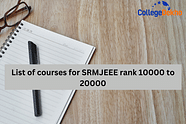
JEE Main isn’t just a test of what you know; it’s also a test of how quickly and reliably you can use that knowledge under pressure. The 2026 pattern continues to reward correctness, which means +4 for a correct answer, and similarly, it deducts −1 for each wrong answer. This test is computer-based and has a mix of MCQs and numerical-type questions across Physics, Chemistry and Mathematics. Knowing concepts are not enough as there needs to be a proper strategy. Combining fast problem selection, clean solution steps, and careful answer checking will help you in the long run.
Also Check -
Modern Physics in JEE Main 2026: Latest Practice Questions with Stepwise Solutions
Quick Snapshot of the Latest JEE Main 2026 Exam Pattern
Paper 1 (B.E/B.Tech) has three sections which involve Physics, Chemistry, Mathematics, and it typically carries 25 questions each, totalling 75. Questions include MCQs and numerical/value-type items; total marks generally 300 with +4/−1 scheme on most questions. These specifics shape how you choose which questions to attempt and how long to spend on each.
Important recent changes (from NTA updates): removal of optional choices in some numerical sections (so questions are to be attempted as per the new pattern), clarifications on use of the virtual calculator, and some administrative changes like more test cities and live photo e-KYC—these don’t change math but affect exam-day comfort and logistics. Stay updated on official notices.
Quick Links:
| JEE Main 2026 Syllabus | JEE Main Previous Year Question Papers with Solutions PDF |
|---|---|
| JEE Main Practice Test | JEE Main 2026 Mock Test |
Effective Strategies to Boost Speed and Accuracy in JEE Main 2026
1. Master fundamentals first
Fast solving comes from clarity. Spend the early months (6–9 months out) strengthening core concepts in NCERT + standard reference problems. For each chapter, identify the must-know theorem/formula list and typical question types. When the basics are automatic, solving becomes faster and less error-prone.
2. Practice purposefully
Simulate exam conditions with full-length, computer-based mock tests. Do timed practice in blocks (e.g., 25-question subject blocks or 3-hour full tests). Track:
Time per question
Questions left unattempted
Types of errors (careless, conceptual, calculation)
Regular timed practice improves both tempo and stamina. Aim to reduce average time per question gradually while keeping accuracy ≥85% in practice.
3. Learn to Triage Questions
Not all questions are equal. On the first pass, rapidly categorise:
Attempt immediately (clear, quick)
Mark for later (needs some steps)
Skip (time sink or very risky)
A practical rule is to spend no more than 2–3 minutes on a medium question before marking it for review. This prevents time drain on one problem and improves total correct attempts.
4. Build fast calculation & mental math habits
Shortcuts, approximations, fraction tricks, and algebraic patterns save precious seconds. Practice multiplication tricks, simplification techniques, and common integrals/derivative templates so that manipulations become muscle memory. Use small daily drills (10–15 min) strictly for speed math.
5. Use strong written steps to avoid careless mistakes
Even when speeding up, write short, clean steps for multi-step problems—especially in Physics and Math. Abbreviated but clear working reduces the chance of copying the wrong sign, mixing units, or mis-evaluating an expression.
6. Error log: the single most powerful accuracy tool
Maintain a "mistake notebook." After every mock or test, log:
The question (shortly)
Error type (conceptual/calc/careless)
The correct approach
The best practice is to review this notebook weekly and re-solve those problems until they stop recurring. This targeted repair increases accuracy faster than untargeted practice.
7. Practice numerical/value-type questions deliberately
With the newer pattern changes, numerical questions are non-negotiable. They often require stepwise calculation—practice them under timed conditions and work on precision. Learn to stop when an answer seems out-of-range; a quick estimate check prevents wild numeric mistakes
8. Mock tests + detailed analysis loop
Take mocks under exam-like conditions (computer mode, same time of day). Post-test, spend 2–3 times the exam duration analyzing:
Every wrong answer
Time spent per question
Questions you skipped but later solved easily
This feedback loop is what converts practice into performance.
9. Fine-tune exam-day strategy (last 1–2 months)
Start with your strongest section to build confidence and momentum.
Keep buffer time (15–20 minutes) at end to re-check marked questions.
Use the triage rule; don’t waste time on “clever but lengthy” questions early on.
If a numerical answer seems improbable, quickly estimate to filter calculation errors.
10. Mental conditioning and small habits
Good sleep, short meditation, and timed breakfast rehearsals matter. Practice mock tests at the same time the exam is scheduled to align your peak focus time. Familiarize with the virtual calculator rules and interface—NTA has issued clarifications to avoid last-minute surprises.
Also Check -
JEE Main 2026 Ray and Wave Optics Practice Sets with Solved Examples
Final Takeaways for JEE Main 2026
Balance matters: speed without accuracy loses marks due to negative marking; accuracy without speed reduces attempted correct answers. Aim for increasing correct attempts per hour.
Deliberate practice wins: timed mocks, an honest error log, and triage skills are the shortest path to steady rank improvement.
Pattern awareness: 2026 pattern changes make numerical questions important and emphasise simulation in computer mode—practice accordingly. Keep checking official NTA notices for any last-minute updates.
In conclusion, improving both speed and accuracy is a step-by-step process: build a strong conceptual base, drill with purpose, analyse mistakes, and sharpen selection and calculation habits. Practice smart, review harder, and simulate real exam conditions frequently. If you follow the strategies above consistently, you’ll see measurable improvement in both attempts and net score for JEE Main 2026.
Related Articles
| Overlooked but High-Impact Chapters in JEE Main 2026 Syllabus | Smart Time Management Hacks to Boost Your JEE Main 2026 Math Score |
|---|
Are you feeling lost and unsure about what career path to take after completing 12th standard?
Say goodbye to confusion and hello to a bright future!

FAQs
Simply increasing speed without maintaining accuracy can actually reduce your final score because of negative marking. Accuracy should be your first priority. When you solve questions correctly, your confidence improves and speed naturally follows. Focus on understanding concepts clearly, writing clean steps, and avoiding careless mistakes. Once your accuracy becomes stable, start practising with timers to increase your solving pace. Regular mock tests and consistent revision of formulas also help. Remember, the goal in JEE Main is to maximise correct attempts—not just attempt more questions. Balanced improvement in both areas leads to better performance.
To avoid negative marking, focus on accuracy first. Never guess blindly, especially in MCQs where wrong answers lead to marks being deducted. Read every question carefully and check for tricky words like “not,” “incorrect,” or “least.” Keep your steps clean so you don’t make calculation mistakes. For Physics and Maths, double-check signs, formulas and units. For numerical-value questions, do a quick estimation to see if your final answer appears reasonable. If a question feels too confusing or time-consuming, skip it instead of risking an incorrect response. Staying calm and careful helps reduce errors significantly.
A smart timer strategy can make a big difference on exam day. Start with a quick scan of all questions and attempt the ones that look easy and straightforward. These questions help boost confidence and save time. Mark moderate ones for the second round and completely skip any question that seems confusing or too lengthy. This prevents unnecessary time loss. Try to maintain a balanced pace so you don’t spend too long on a single question. Keep buffer time at the end to re-check marked questions. This structured approach helps maximise both speed and accuracy.
Mock tests are one of the most effective tools for improving performance in JEE Main. Start with one mock test per week so you can understand your strengths and weaknesses. As the exam approaches, increase the frequency to two tests per week, and during the last two months, aim for three to four full-length mocks weekly. The goal is not just taking more tests but analysing them properly. Focus on correcting your mistakes, improving time management, and understanding which question types slow you down. This consistent mock-test cycle helps build stamina, confidence, and accuracy.
No. Speed without accuracy leads to negative marking. Aim for a balance by solving steadily, keeping steps clean, and focusing on error-free attempts first. Speed naturally improves with practice.No. Speed without accuracy leads to negative marking. Aim for a balance by solving steadily, keeping steps clean, and focusing on error-free attempts first. Speed naturally improves with pTo improve both speed and accuracy, start by strengthening your basics in every chapter. When your concepts are clear, solving becomes faster and more confident. Next, practise regularly under timed conditions to get used to the exam pressure. Solve topic-wise tests, section-wise tests, and full-length mock papers. After every test, analyse your mistakes carefully and note the reason behind each error. This helps you avoid repeating them. Also, learn to quickly identify easy, moderate, and lengthy questions so you can attempt smartly. With consistent practice, your speed and accuracy naturally improve..
Was this article helpful?




















Similar Articles
GATE Mechanical Engineering (ME) Subject Wise Weightage & Best Books 2026
JEE Main City Intimation Slip 2026 (Soon): Session 1 Exam Centre, Steps to Download @jeemain.nta.nic.in
SRM University Fees Structure for BTech with Hostel 2026
List of Courses for SRMJEEE Rank up to 20000
GATE ST 2026: Exam Date, Syllabus, Question Paper, Answer Key, Response Sheet
Does Amrita University accept JEE Main score?